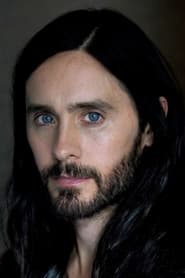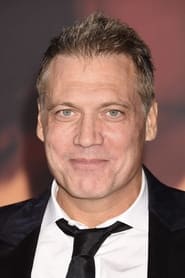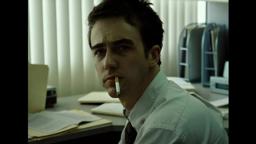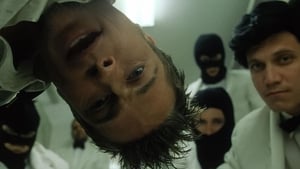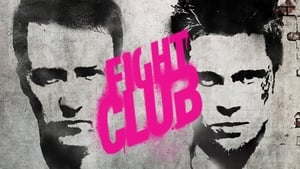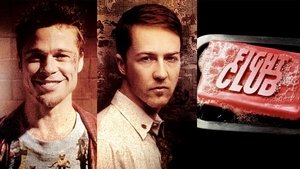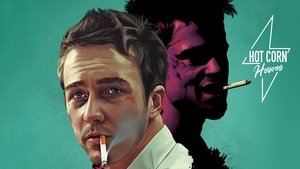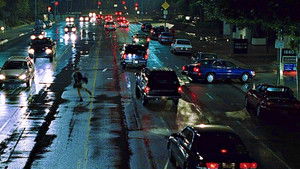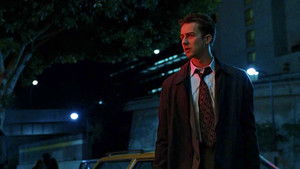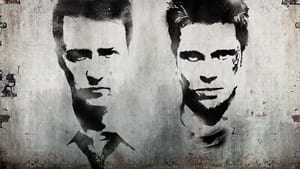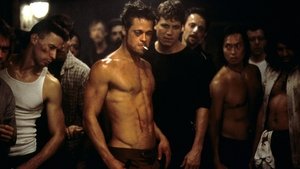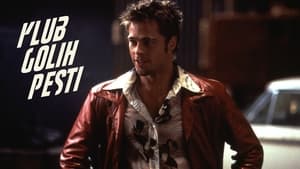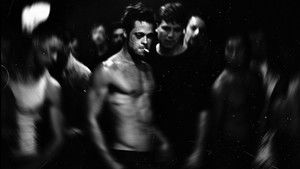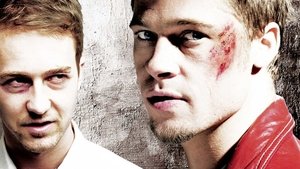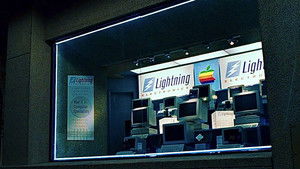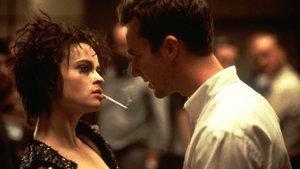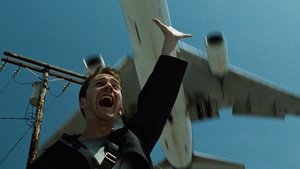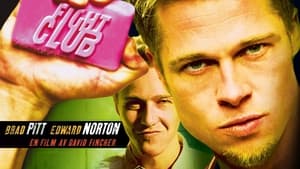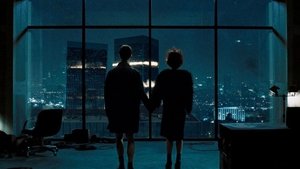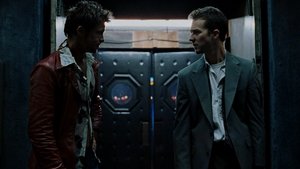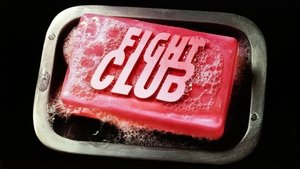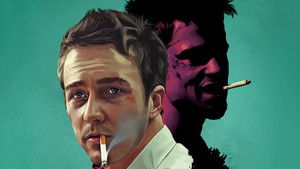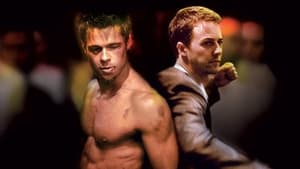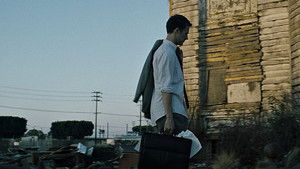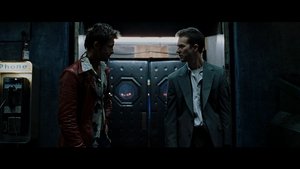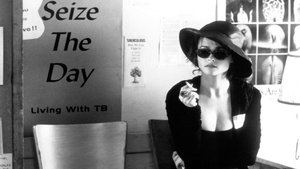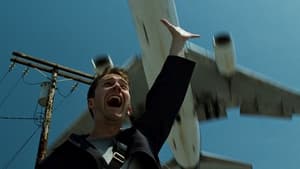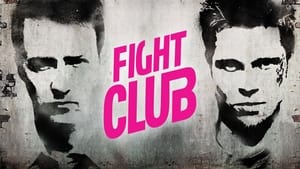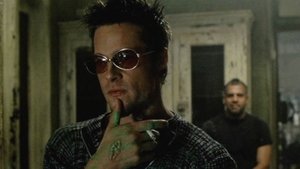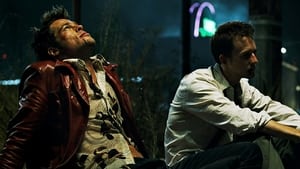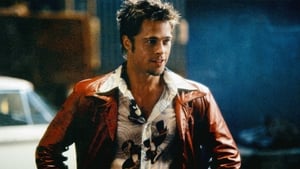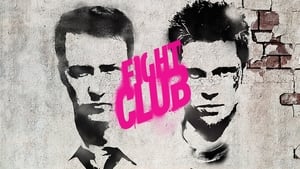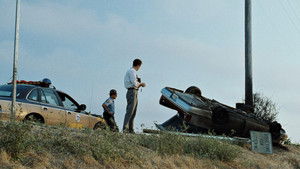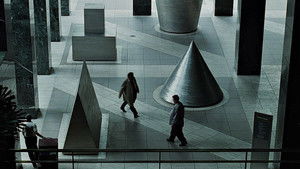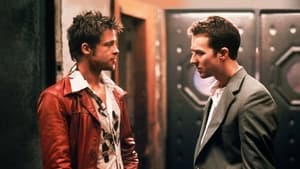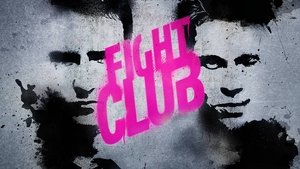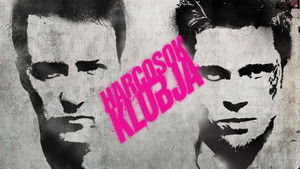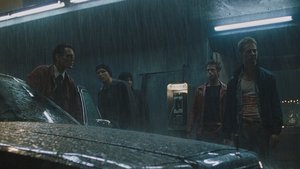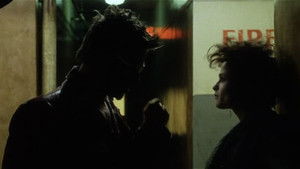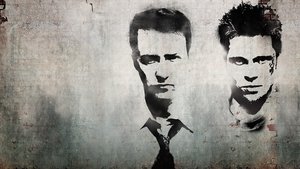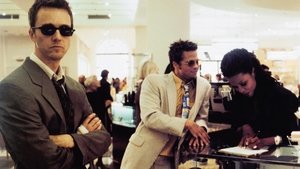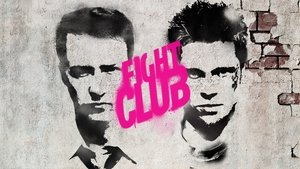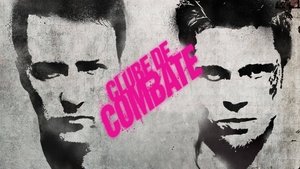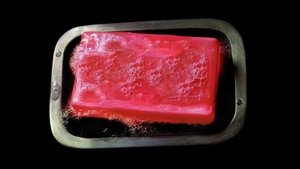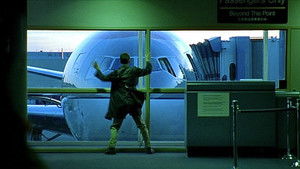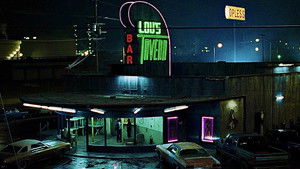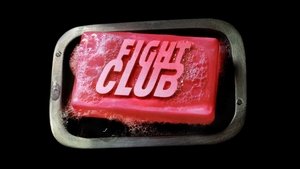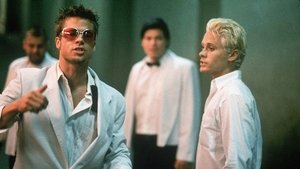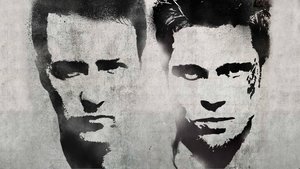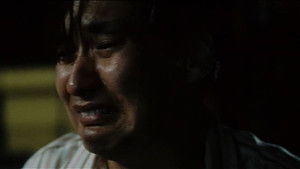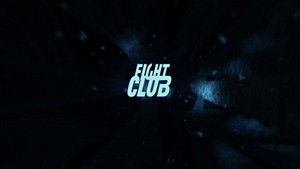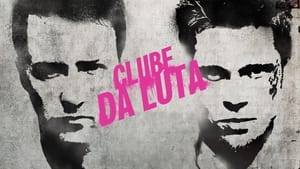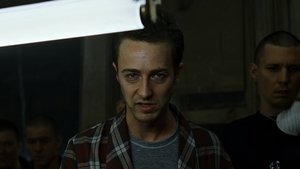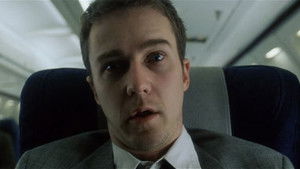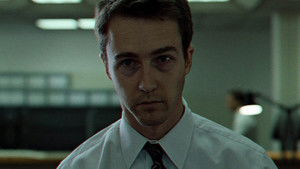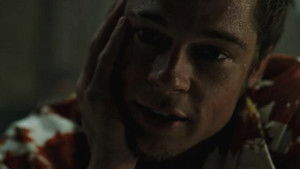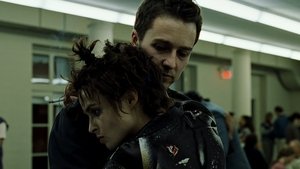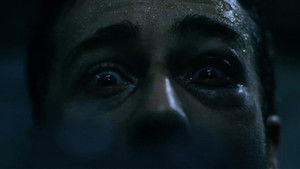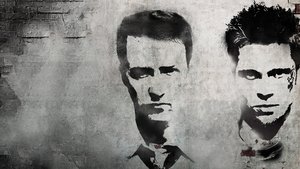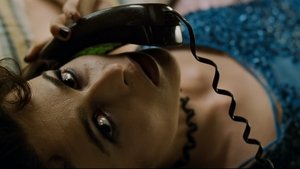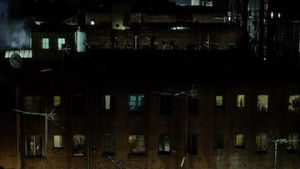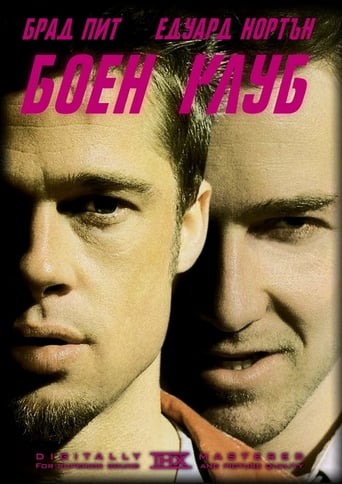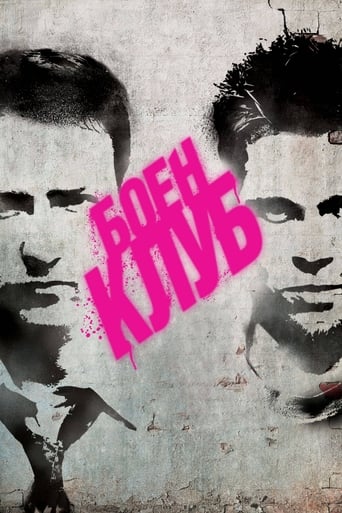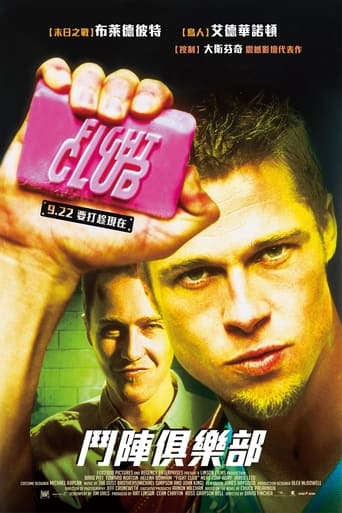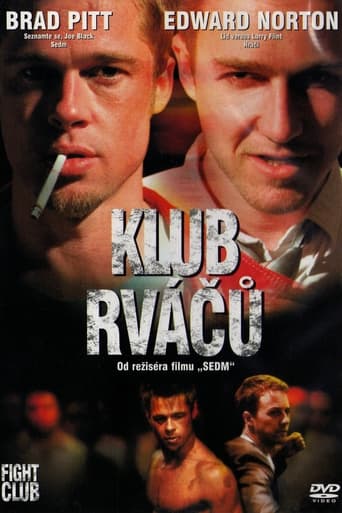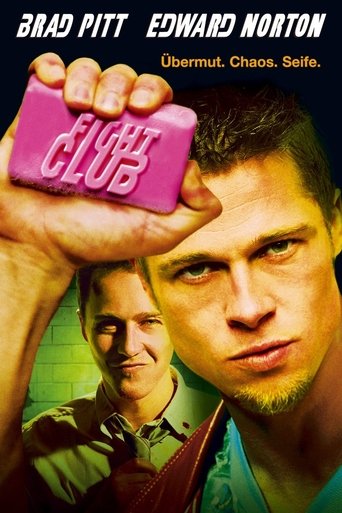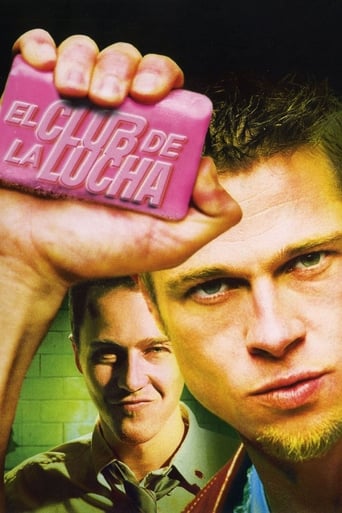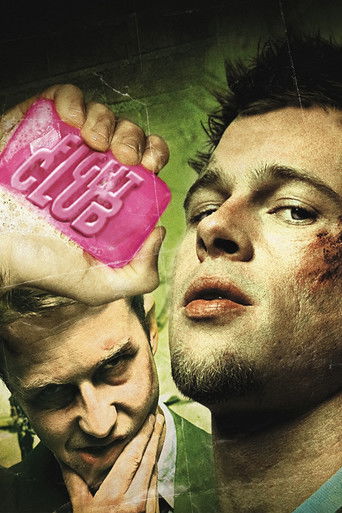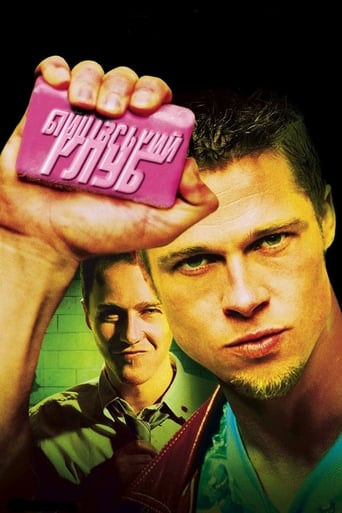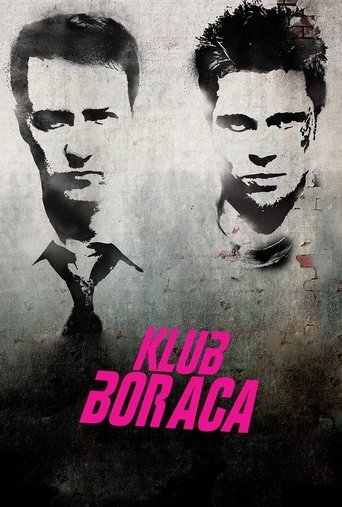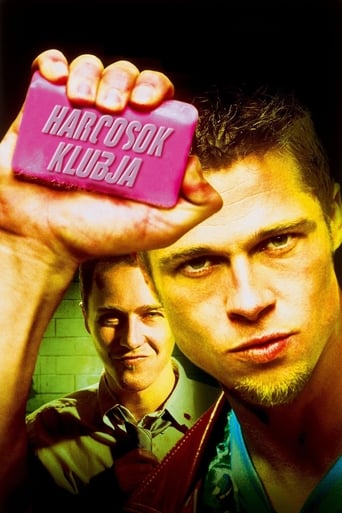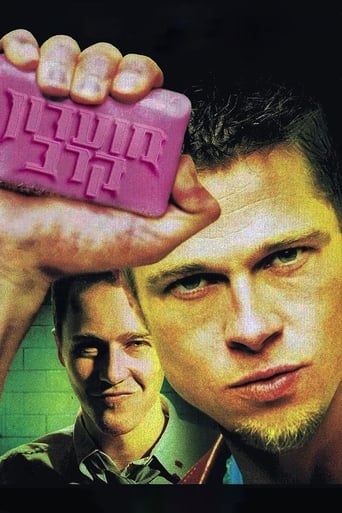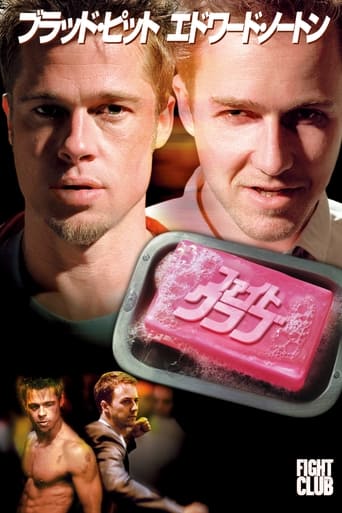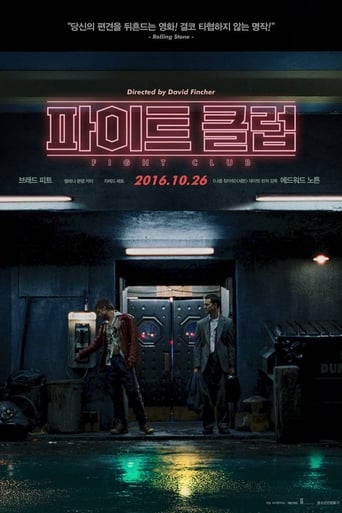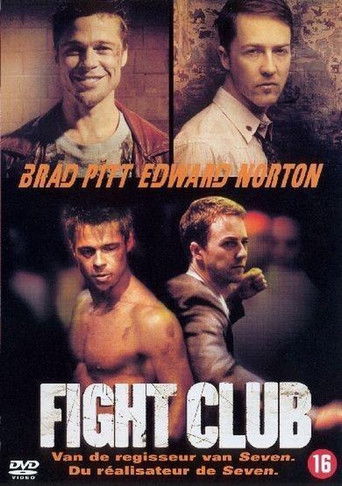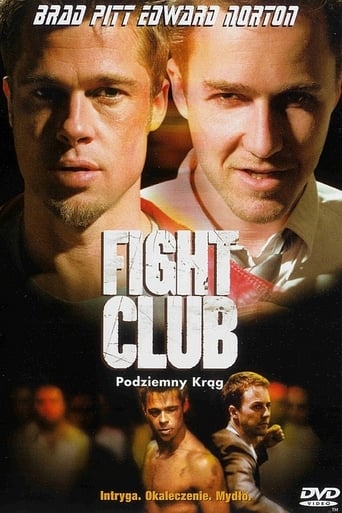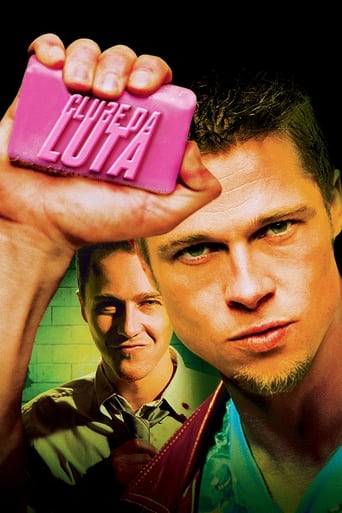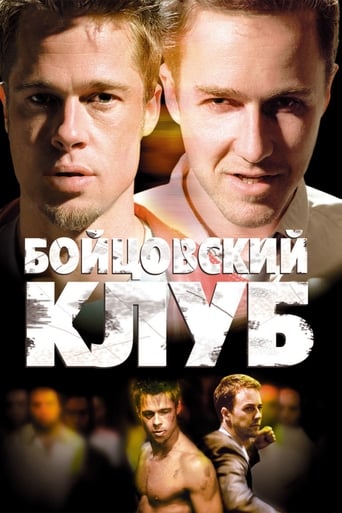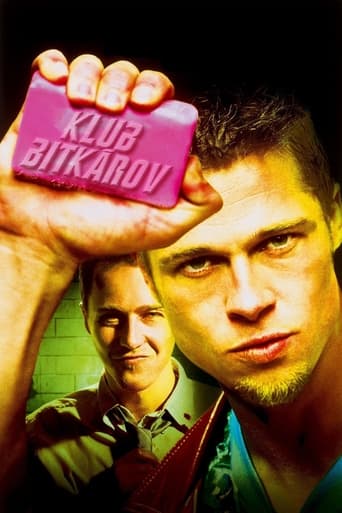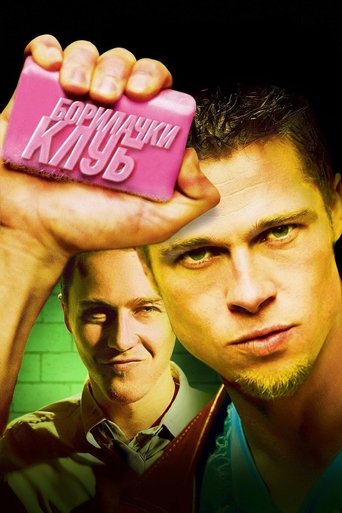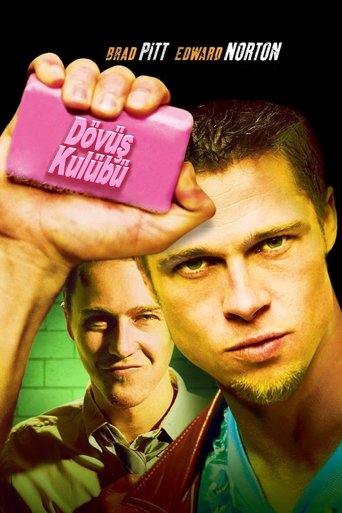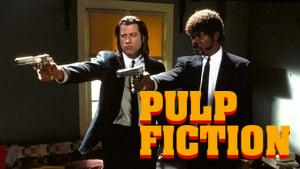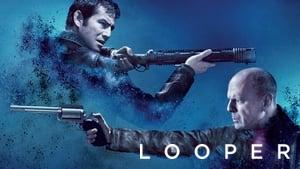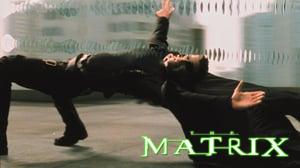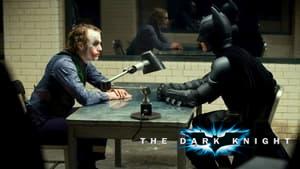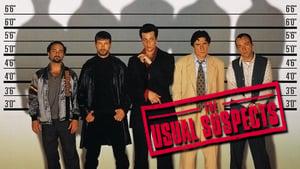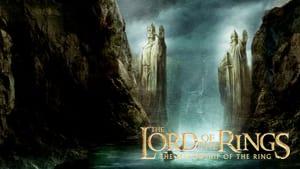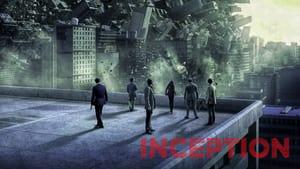
Fight Club
Mischief. Mayhem. Soap.
1999 | 139m | English
Popularity: 24 (history)
| Director: | David Fincher |
|---|---|
| Writer: | Chuck Palahniuk, Jim Uhls |
| Staring: |
| A ticking-time-bomb insomniac and a slippery soap salesman channel primal male aggression into a shocking new form of therapy. Their concept catches on, with underground "fight clubs" forming in every town, until an eccentric gets in the way and ignites an out-of-control spiral toward oblivion. | |
| Release Date: | Oct 15, 1999 |
|---|---|
| Director: | David Fincher |
| Writer: | Chuck Palahniuk, Jim Uhls |
| Genres: | Drama, Thriller |
| Keywords | based on novel or book, support group, dual identity, nihilism, fight, rage and hate, insomnia, dystopia, alter ego, breaking the fourth wall, split personality, quitting a job, dissociative identity disorder, self destructiveness |
| Production Companies | 20th Century Fox, Regency Enterprises, Fox 2000 Pictures, Linson Entertainment, Taurus Film |
| Box Office |
Revenue: $100,853,753
Budget: $63,000,000 |
| Updates |
Updated: Jan 15, 2026 Entered: Apr 13, 2024 |
| Name | Character |
|---|---|
| Edward Norton | Narrator |
| Brad Pitt | Tyler Durden |
| Helena Bonham Carter | Marla Singer |
| Meat Loaf | Robert Paulson |
| Jared Leto | Angel Face |
| Zach Grenier | Richard Chesler (Regional Manager) |
| Holt McCallany | The Mechanic |
| Eion Bailey | Ricky |
| Richmond Arquette | Intern at Hospital |
| David Andrews | Thomas at Remaining Men Together |
| George Maguire | Group Leader at Remaining Men Together |
| Eugenie Bondurant | Weeping Woman - Onward and Upward |
| Christina Cabot | Group Leader - Partners in Positivity |
| Sydney 'Big Dawg' Colston | Speaker - Free and Clear |
| Rachel Singer | Chloe |
| Christie Cronenweth | Airline Check-In Attendant |
| Tim DeZarn | Federated Motor Co. - Inspector Bird |
| Ezra Buzzington | Federated Motor Co. - Inspector Dent |
| Dierdre Downing-Jackson | Business Woman on Plane |
| Bob Stephenson | Airport Security Officer |
| Charlie Dell | Doorman at Person Towers |
| Rob Lanza | Man in Suit |
| David Lee Smith | Walter |
| Joel Bissonnette | Food Court Maitre d' |
| Evan Mirand | 'Steph' |
| Robby Robinson | Next Month's Opponent |
| Lou Beatty Jr. | Cop at Marla's Building |
| Thom Gossom Jr. | Detective Stern |
| Valerie Bickford | Cosmetics Buyer |
| Peter Iacangelo | Lou |
| Carl Ciarfalio | Lou's Body Guard |
| Stuart Blumberg | Car Salesman |
| Todd Peirce | First Man at Auto Shop |
| Mark Fite | Second Man at Auto Shop |
| Matt Winston | Seminary Student |
| Joon Kim | Raymond K. Hessel |
| Bennie Moore | Bus Driver with Broken Nose |
| Lauren Sánchez Bezos | Channel 4 Reporter |
| Pat McNamara | Commissioner Jacobs |
| Tyrone R. Livingston | Banquet Speaker |
| Owen Masterson | Airport Valet |
| David Jean Thomas | Policeman |
| Paul Carafotes | Salvator - Winking Bartender |
| Christopher John Fields | Proprietor of Dry Cleaners |
| Anderson Bourell | Bruised Bar Patron #1 |
| Scotch Ellis Loring | Bruised Bar Patron #2 |
| Michael Shamus Wiles | Bartender in Halo |
| Andi Carnick | Hotel Desk Clerk |
| Ed Kowalczyk | Waiter at Clifton's |
| Leonard Termo | Desk Sergeant |
| Van Quattro | Detective Andrew |
| Markus Redmond | Detective Kevin |
| Michael Girardin | Detective Walker |
| Michael Arturo | BMW Salesman. (uncredited) |
| Greg Bronson | Fight Spectator (uncredited) |
| Matt Cinquanta | Fighter (uncredited) |
| Paul Dillon | Irvin (uncredited) |
| Eddie Hargitay | Chanting Fighter (uncredited) |
| Phil Hawn | Banquet Guest (uncredited) |
| Bruce Holman | Waiter in Bridgeworth Suites Corporate Video (uncredited) |
| Jawara | Fight Patron Saying 'I don't know. What's going on?' (uncredited) |
| Baron Jay | Waiter (uncredited) |
| Jim Jenkins | Restaurant Maitre D' (uncredited) |
| Kevin Scott Mack | Passenger Clutching Armrest (uncredited) |
| Trey Ore | Fight Club Patron / Guy #2 in Video Store (uncredited) |
| Louis Ortiz | Fight Spectator (uncredited) |
| Hugh Peddy | Fight Club Man (uncredited) |
| J.T. Pontino | Fight Club Man (uncredited) |
| Chad Randau | Waiter (uncredited) |
| Marcio Rosario | Fighter (uncredited) |
| Gregory Silva | Riley Wilde - Fighter (uncredited) |
| Brian Tochi | Fight Bully (uncredited) |
| Michael Zagst | Support Group Member (uncredited) |
| Marc Cinquanta | Space Monkey (uncredited) |
| Summer Moore | Marla's Neighbor (uncredited) |
| Violet Voss | 主演 |
| Name | Job |
|---|---|
| Jeff Cronenweth | Director of Photography |
| Laray Mayfield | Casting |
| Richard Hymns | Sound Editor, Sound Supervisor |
| Chuck Palahniuk | Novel |
| Jim Uhls | Screenplay |
| Seth Reed | Assistant Art Director |
| Conrad W. Hall | Camera Operator |
| Chris Haarhoff | Steadicam Operator |
| Fríða Aradóttir | Key Hair Stylist |
| Michael Runyard | Stunt Coordinator |
| Jeff Imada | Stunts |
| Richard Cetrone | Utility Stunts |
| Steve Boeddeker | Sound Effects Editor |
| Carlos Saldanha | Animation Supervisor |
| Jimmy Nickerson | Stunts |
| Brandon Proctor | Sound Mix Technician |
| David Leitch | Stunts |
| Ren Klyce | Sound Editor, Sound Designer |
| Michael Kaplan | Costume Design |
| Kevin Scott Mack | Visual Effects Supervisor |
| Peter Ramsey | Storyboard Artist |
| Damon Caro | Stunt Double, Fight Choreographer |
| Rich Thorne | Production Executive |
| David Parker | Sound Re-Recording Mixer |
| Michael Semanick | Sound Re-Recording Mixer |
| Doc Kane | ADR Mixer |
| John Roesch | Foley Artist |
| Rob Bottin | Makeup Effects |
| Mickie McGowan | ADR Voice Casting |
| David Fincher | Director |
| Carl Ciarfalio | Stunts |
| Hiro Koda | Stunts |
| Ryan Christopher Keys | Stunts |
| Debbie Evans | Stunts |
| Darrin Prescott | Stunts |
| Chris O'Hara | Utility Stunts |
| David Wald | Stunts |
| Denney Pierce | Stunts |
| Jimmy N. Roberts | Stunts |
| John King | Original Music Composer |
| Michael Simpson | Original Music Composer |
| James Haygood | Editor |
| Rachel Wyn Dunn | Compositors |
| Mirela Rupic | Assistant Costume Designer |
| Chris Gorak | Art Direction |
| Dianne Chadwick | Art Department Assistant |
| S. Quinn | Art Department Coordinator |
| Josue Clotaire Fleurimond | Conceptual Design |
| Jeff Passanante | Construction Coordinator |
| Tim R. Lafferty | Construction Foreman |
| Craig B. Ayers Sr. | Greensman |
| P. Scott Bailey | Leadman |
| Jack Robinson | Location Scout |
| Tammy DeRuiter | Painter |
| Richard K. Buoen | Production Illustrator |
| Kenneth Garrett | Sculptor |
| Luis G. Hoyos | Set Designer |
| Bill 'Kauhane' Hoyt | Standby Painter |
| John T. Connor | First Assistant Camera |
| Robert Mehnert | Aerial Camera |
| Merrick Morton | Still Photographer |
| Elinor Bardach | Costume Supervisor |
| Patricia Miller | Hairstylist |
| Jean Ann Black | Makeup Artist |
| Greg Solomon | Prosthetic Makeup Artist |
| Terry Anderson | Set Costumer |
| Charles W. Belisle | Set Dressing Artist |
| P.J. Hanke | Additional Music |
| Yann Blondel | CG Supervisor |
| Raymond Bulinski | Craft Service |
| Francie Brown | Dialect Coach |
| Manny Demello | Driver |
| Karman Graham | Post Production Assistant |
| Peter Mavromates | Post Production Supervisor |
| Kieran Woo | Production Controller |
| Carrie Shaw | Production Office Assistant |
| David B. Brenner | Propmaker |
| Katherine Jones | Set Medic |
| Michael Herron | Set Production Assistant |
| Lucio I. Flores | Software Engineer |
| Cliff Wenger | Special Effects Coordinator |
| Chad Keller | Stand In |
| Leon Xiao | Systems Administrators & Support |
| Jim Alfonso | Transportation Captain |
| Dave Robling | Transportation Coordinator |
| Helen Pollak | Unit Production Manager |
| Wayne Tidwell | Video Assist Operator |
| Dina Waxman | Script Supervisor |
| Michael Matzdorff | First Assistant Editor |
| Michael Arvanitis | Best Boy Electric |
| Kevin Brown | Lighting Technician |
| Martin Bosworth | Rigging Gaffer |
| Ronald A. Miller | Rigging Grip |
| Karen Meisels | Casting Associate |
| Flint Maloney | Location Manager |
| Jim Davidson | Production Accountant |
| Robb Earnest | Production Coordinator |
| Carey Ann Strelecki | Researcher |
| Don Coufal | Boom Operator |
| Jessica Bellfort | Assistant Sound Editor |
| Brian Richards | Music Editor |
| Jeff Wexler | Sound Mixer |
| Julie M. Anderson | Production Supervisor |
| Jim Rutherford | 3D Animator |
| Nicholas Brooks | Digital Compositors |
| Joshua I. Kolden | Visual Effects |
| Lauren A. Littleton | Visual Effects Coordinator |
| Andrea D'Amico | Visual Effects Producer |
| Johann Benét | Thanks |
| Wendy M. Craig | Set Costumer |
| David Orr | Color Timer |
| Richard Quinn | Dialogue Editor |
| Roy 'Bucky' Moore | Property Master |
| Rhona Meyers | Key Costumer |
| Bob Wagner | Second Assistant Director |
| Allen Kupetsky | Second Second Assistant Director |
| Bryan Duff | Assistant Property Master |
| Eric Rosenberg | Graphic Designer |
| Danielle Simpson | Set Dressing Buyer |
| Collin Grant | Storyboard Artist |
| Tom Bellfort | ADR Editor |
| Derek Casari | ADR Engineer |
| David Boulton | ADR Mixer |
| David Lucarelli | ADR Recordist |
| Mary Works | Assistant Dialogue Editor |
| Hilda Hodges | Foley Artist |
| Mary Jo Lang | Foley Mixer |
| Carolyn Tapp | Foley Recordist |
| Wayne Burnes | Special Effects Technician |
| Ryan Laney | Visual Effects Technical Director |
| Steve Wolfe | Assistant Camera |
| Craig Kohtala | Best Boy Grip |
| Gary Kanner | Camera Loader |
| Michael Brennan | Dolly Grip |
| Lisa Guerriero | Second Assistant Camera |
| Christie Cean George | Casting Assistant |
| Joëlle Taar | Assistant Editor |
| Chris Gutierrez | Assistant Location Manager |
| David McKimmie | Assistant Production Coordinator |
| Sande Alessi | Extras Casting |
| Scott Ross | General Manager |
| Raymond Bongiovanni | In Memory Of |
| David Bailey | Matte Painter |
| Cindy Nevins | Payroll Accountant |
| Ron Frankel | Pre-Visualization Supervisor |
| Tanya Doyle | Production Assistant |
| Shaun Ryan | Production Driver |
| Fiona Campbell Westgate | Rotoscoping Artist |
| Eileen M. Dennis | Second Assistant Accountant |
| Kevin Tod Haug | Visual Effects Supervisor |
| Mike Topoozian | First Assistant Director |
| Richard Schuler | Location Manager |
| Michael J. Coo | Key Grip |
| Julie L. Pearce | Key Makeup Artist |
| Randy Westgate | Makeup Artist |
| Margaret Prentice | Makeup Artist |
| Wendy J. Greiner | Key Costumer |
| Tani Kunitake | Production Illustrator |
| Hugo Santiago | Set Designer |
| Peter J. Kelly | Set Designer |
| Domenic Silvestri | Set Designer |
| Julia K. Levine | Set Designer |
| Frank Roughan | Transportation Captain |
| Alex Olivares | First Assistant Editor |
| Todd Boekelheide | Sound Re-Recording Mixer |
| Ewa Sztompke | Dialogue Editor |
| David C. Hughes | Sound Effects Editor |
| Charleen Richards-Steeves | ADR Mixer |
| Myke Michaels | Stunts |
| James M. Halty | Stunts |
| Lane Leavitt | Stunts |
| Misa Kageyama | Assistant Sound Designer |
| Sean Hood | Swing |
| Joe Hartwick Jr. | First Assistant Accountant |
| Alex McDowell | Production Design |
| Dennis Berardi | Visual Effects Supervisor |
| Jay Hart | Set Decoration |
| Gwendolyn Yates Whittle | ADR Supervisor |
| Claudio Miranda | Gaffer |
| Matthew E. Butler | CG Supervisor |
| Name | Title |
|---|---|
| Ceán Chaffin | Producer |
| Art Linson | Producer |
| Arnon Milchan | Executive Producer |
| Ross Grayson Bell | Producer |
| John S. Dorsey | Associate Producer |
| Organization | Category | Person |
|---|
Popularity History
| Year | Month | Avg | Max | Min |
|---|---|---|---|---|
| 2024 | 4 | 138 | 229 | 90 |
| 2024 | 5 | 262 | 301 | 209 |
| 2024 | 6 | 178 | 272 | 93 |
| 2024 | 7 | 112 | 145 | 84 |
| 2024 | 8 | 94 | 146 | 69 |
| 2024 | 9 | 74 | 128 | 59 |
| 2024 | 10 | 87 | 126 | 66 |
| 2024 | 11 | 107 | 174 | 86 |
| 2024 | 12 | 108 | 208 | 84 |
| 2025 | 1 | 119 | 153 | 89 |
| 2025 | 2 | 112 | 149 | 26 |
| 2025 | 3 | 51 | 146 | 0 |
| 2025 | 4 | 32 | 40 | 26 |
| 2025 | 5 | 26 | 36 | 22 |
| 2025 | 6 | 23 | 32 | 19 |
| 2025 | 7 | 21 | 24 | 18 |
| 2025 | 8 | 20 | 26 | 18 |
| 2025 | 9 | 27 | 41 | 17 |
| 2025 | 10 | 22 | 30 | 18 |
| 2025 | 11 | 17 | 23 | 14 |
| 2025 | 12 | 22 | 30 | 14 |
| 2026 | 1 | 37 | 83 | 22 |
Trending Position
| Year | Month | High | Avg |
|---|---|---|---|
| 2026 | 1 | 84 | 189 |
| Year | Month | High | Avg |
|---|---|---|---|
| 2025 | 12 | 92 | 201 |
| Year | Month | High | Avg |
|---|---|---|---|
| 2025 | 11 | 87 | 159 |
| Year | Month | High | Avg |
|---|---|---|---|
| 2025 | 10 | 3 | 320 |
| Year | Month | High | Avg |
|---|---|---|---|
| 2025 | 9 | 3 | 358 |
| Year | Month | High | Avg |
|---|---|---|---|
| 2025 | 8 | 189 | 644 |
| Year | Month | High | Avg |
|---|---|---|---|
| 2025 | 7 | 37 | 493 |
| Year | Month | High | Avg |
|---|---|---|---|
| 2025 | 6 | 32 | 141 |
| Year | Month | High | Avg |
|---|---|---|---|
| 2025 | 5 | 40 | 207 |
| Year | Month | High | Avg |
|---|---|---|---|
| 2025 | 4 | 33 | 128 |
| Year | Month | High | Avg |
|---|---|---|---|
| 2025 | 3 | 39 | 246 |
| Year | Month | High | Avg |
|---|---|---|---|
| 2025 | 2 | 50 | 206 |
| Year | Month | High | Avg |
|---|---|---|---|
| 2025 | 1 | 62 | 158 |
| Year | Month | High | Avg |
|---|---|---|---|
| 2024 | 12 | 73 | 208 |
| Year | Month | High | Avg |
|---|---|---|---|
| 2024 | 11 | 53 | 151 |
| Year | Month | High | Avg |
|---|---|---|---|
| 2024 | 10 | 80 | 152 |
| Year | Month | High | Avg |
|---|---|---|---|
| 2024 | 9 | 72 | 102 |
| Year | Month | High | Avg |
|---|---|---|---|
| 2024 | 8 | 77 | 124 |
Pretty awesome movie. It shows what one crazy person can convince other crazy people to do. Everyone needs something to believe in. I recommend Jesus Christ, but they want Tyler Durden. ...
In my top 5 of all time favourite movies. Great story line and a movie you can watch over and over again. ...
If you enjoy reading my Spoiler-Free reviews, please follow my blog @ https://www.msbreviews.com David Fincher’s new film, Mank, is coming soon on Netflix, released six years after his latest installment, Gone Girl. Therefore, this week I’m reviewing five of Fincher’s movies. Se7en was the first ... one, and now it’s time for one of the most culturally impactful films of the 90s, Fight Club. This is another rewatch of another filmmaking classic, one that I was never able to absolutely adore like most people. When this movie came out in 1999, critics were extremely divided, and the film failed at the box office. With time, it gained a cult following through home media, but it’s still considered a very controversial piece of cinema. So, nothing new, having in mind Fincher is at the helm. Despite this being my third or fourth time experiencing this story, I never really changed my opinion about it, which is a bit uncommon in my viewing history. Usually, after multiple rewatches, my overall thoughts about a movie slightly vary, but Fight Club is one of the few exceptions. I believe my opinion remains intact from the very first watch. I really enjoy this film, but I can’t state that I absolutely love it. Since this is a special case, I’m going to start with what still bothers me after so many viewings, something I also rarely do in my reviews since I always leave the bad stuff to the end of the article. Without spoiling anything, of course, there’s a vital plot twist that comes later in the movie that I could only appreciate by its execution, but never by its impact on the narrative. Jim Uhls’ screenplay relies on the main characters’ friendship to carry the story forward, and throughout the first two acts, Fincher leaves not-that-subtle hints to a massive revelation, which eventually triggers the beginning of the third act. This major plot point is brilliantly executed, and I still feel incredibly fascinated by its delivery, both in terms of the dialogue and the performances. However, its impact on any lightly focused, observant viewer is close to zero due to the clear evidence that pointed towards this development. Now, I don’t want to sound like that stereotypical moviegoer that says, “I guessed the twist before its revelation, hence it all sucks”. Like I insinuate above, I was still wholly captivated during the entirety of the third act. Nevertheless, Fight Club’s runtime is far from being short, and Fincher spends a lot of time building up an idea that loses its surprise factor even before the film’s midpoint. It changes the protagonist’s perspective, it takes the viewer through a predictable yet entertaining path, setting up a powerful, meaningful ending. However, personally, I don’t feel like the time spent in the first two acts was satisfyingly compensated in the end… at least, not in its entirety. The second act also has a short period where it loses a bit of steam due to some repetitive sequences and an unnecessary amount of flashbacks. Again, I feel like Fincher didn’t completely trust the audience back then, contrary to his procedure in Se7en. In the latter flick, Fincher left the biggest responsibility to the viewer’s imagination, leaving the murder scenes for the audience to picture in their minds. In Fight Club, that ambiguity and implicit dialogue are still present, sure, but even before the third act, there’s already an attempt to explain too much certain portions of the narrative that I wish would stay vaguer. Without spoiling anything, of course, there’s a vital plot twist that comes later in the movie that I could only appreciate by its execution, but never by its impact on the narrative. Jim Uhls’ screenplay relies on the main characters’ friendship to carry the story forward, and throughout the first two acts, Fincher leaves not-that-subtle hints to a massive revelation, which eventually triggers the beginning of the third act. This major plot point is brilliantly executed, and I still feel incredibly fascinated by its delivery, both in terms of the dialogue and the performances. However, its impact on any lightly focused, observant viewer is close to zero due to the clear evidence that pointed towards this development. Now, I don’t want to sound like that stereotypical moviegoer that says, “I guessed the twist before its revelation, hence it all sucks”. Like I insinuate above, I was still wholly captivated during the entirety of the third act. Nevertheless, Fight Club’s runtime is far from being short, and Fincher spends a lot of time building up an idea that loses its surprise factor even before the film’s midpoint. It changes the protagonist’s perspective, it takes the viewer through a predictable yet entertaining path, setting up a powerful, meaningful ending. However, personally, I don’t feel like the time spent in the first two acts was satisfyingly compensated in the end… at least, not in its entirety. The second act also has a short period where it loses a bit of steam due to some repetitive sequences and an unnecessary amount of flashbacks. Again, I feel like Fincher didn’t completely trust the audience back then, contrary to his procedure in Se7en. In the latter flick, Fincher left the biggest responsibility to the viewer’s imagination, leaving the murder scenes for the audience to picture in their minds. In Fight Club, that ambiguity and implicit dialogue are still present, sure, but even before the third act, there’s already an attempt to explain too much certain portions of the narrative that I wish would stay vaguer. Don’t worry, I’m done with the negatives, and don’t forget: I really, really like this movie. Obviously, Fincher and Uhls created a story packed with underlying themes and social commentary. From the whole consumerism theory to the more psychological component regarding Edward Norton’s mental state, every message is seamlessly communicated to the audience. I’ve also been through a point in my life where I wish I’d be someone else, someone who had already achieved every dream of mine successfully with an overwhelming feeling of fulfillment. Coping with the inability to become that perfect someone can become an excruciating, sad, depressing process, and it varies drastically from person to person. Fight Club approaches mental health and people’s acceptance of who they truly are in a groundbreaking manner, capturing Edward Norton’s emotions perfectly and broadcasting his thoughts through some of the best narration in the history of cinema. Its take on the world of consumerism is undoubtedly interesting and plays a big part in the climax of the film. Despite the issues described above, Uhls’ screenplay is very well-written, elevating the conversations between Norton and Brad Pitt (Ad Astra, Once Upon a Time in Hollywood), which are indeed remarkably entertaining. Predictable or not, the main story is wonderfully executed by Fincher, who continues to demonstrate his impressive technical attributes. Once again, the pre-production phase is proved here to be as important as any other stage in the filmmaking process. Fincher’s dedication to his features is palpable and visible on-screen through every single technical aspect. This time, Fincher brought in Jeff Cronenweth as the director of photography, and both worked together to not only create that desaturated, realistic atmosphere that Fincher loves so much but also to deliver the brutal, violent, bloody fight scenes that keep the entertainment levels at their highest. With clean, consistent, coherent editing from James Haygood, the movie flows beautifully despite its lengthy runtime. The Dust Brothers’ score is quite alternative, which suits the also unconventional storytelling. Last but not least, Edward Norton and Brad Pitt. I know it’s incredibly cliche to write that two actors share impeccable chemistry, but Norton and Pitt take it to a whole other level. In two physically-demanding displays, both actors deliver award-worthy performances that marked their careers. Pitt offers one of his most underrated portrayals, being extremely funny throughout the entire film, but also astonishingly badass, carrying his fight sequences as amazing as he does with his dialogues. On the other hand, seeing Norton go all-out is a terrific experience. I lack words to describe such an emotionally compelling interpretation, filled with powerful character moments. A final word of praise to Helena Bonham Carter (Enola Holmes), who also delivers an exceptional performance. In the end, Fight Club is and will probably remain David Fincher’s most controversial movie for a long, long time. With an absolutely brilliant direction and execution, Fincher uses Jim Uhls’ captivating, layered, unconventional screenplay to tackle themes such as consumerism, society’s behavior, and mental health, seamlessly transmitting meaningful yet contentious messages. Once again, the filmmaking in display is technically flawless, going from the trademark authentic cinematography and production design to the unique score, all flowing superbly through excellent editing. Unfortunately, I don’t belong to the group of people who utterly love this film. The excessive (sometimes unnecessary) use of flashbacks doesn’t help, but it’s the enormous build-up packed with overly explicit clues to a significant (yet unsurprising) plot twist that ends up partially ruining the viewing for me. I also wish that the script developed a few plot points more ambiguously, but Brad Pitt and Edward Norton elevate the whole movie so much with their ridiculously outstanding performances that these small issues don’t keep me away from highly recommending one of the most memorable, iconic films of all-time. Rating: A-
I didn't enjoy this, pretty much at all, but still kinda appreciate how it all comes together. It's a weird one for me. Overall, <em>'Fight Club'</em> underwhelmed me. I actually knew very little before viewing it, despite hearing about it on a surface level for years and years; well, one 'regula ... tory' part of it anyway. It's much deeper than I had expected. Unfortunately, I didn't find entertainment with any of it - it was, to be honest, a slog to sit through. The only scene I can remember enjoying is the very last one, and I don't mean that negatively because the end shot is terrific. It's just everything that comes before didn't do anything for me. Yet, I still rate its intentions. It did keep me guessing amidst my, near, boredom and the 'event' is a good one on paper. It just failed to connect on me in actuality. Brad Pitt is good as Tyler, though the likes of Edward Norton and Helena Bonham Carter give meh performances in my opinion. Meat Loaf is interesting, I guess, as Bob. I'm evidently in the extreme minority with my thoughts, each to their own, but I honestly didn't get into it sadly. As noted, though, I still partially rate it weirdly. 6* feels harsh, so I give it 7*.
I was mostly neutral on this movie until the last third, when things turned psychologically thrilling and gave me American Psycho vibes. The "His name was Robert Paulson" scene specifically was where the film turned from 3 starts to 4.5 stars. Would recommend and I intend to return to this in some t ... ime as I feel it has higher rewatchability than many films of this style.
_**Finding enlightenment thru beating each other to a pulp**_ A 30 year-old man in Los Angeles works the office drudgery, but suffers insomnia (Edward Norton). He’s finally inspired by an unconventional woman he meets at support groups (Helena Bonham Carter) and, especially, a devil-may-care guy ... who lives on the outskirts of town (Brad Pitt). They start an underground club where men get together and vent their frustrations by beating the crap out of each other. "Fight Club" (1999) has a huge reputation as a stylish cult flick and is often ranked with the greatest films ever made. The first half is entertaining enough, both quirky and amusing; and I like the interesting themes explored: Escaping the maternal and material, being a slave to advertising, rebelling against life-stifling conformity, being a blind follower of a charismatic leader, finding your inner wild-man, Dr. Jekyll & Mr. Cool, the nature of lawless “revolutionaries” (which is too reminiscent of ANTIFA thugs), the struggle with homosexuality interpretation, etc. That’s all highly commendable. Unfortunately, the second half isn’t compelling. I sat there bored and couldn’t wait for it to end. “Donnie Darko” (2001) had the same problem – promising set-up with clever ideas, but a tedious wrap-up. Meanwhile the twist that everyone gushes over is actually underwhelming and not very surprising, although it’s relatively interesting. Moreover, watching guys get radically beat up is only entertaining a couple times; after that it gets redundant. Speaking of which, how exactly does bare-knuckled fighting inspire or enlighten? Does it really help one’s life to have missing teeth, black eyes and other assorted injuries? Of course the movie doesn’t emphasize the long-lasting negative effects of regular brawling. Have you ever met a brawler, boxer or professional football player in his 50s with the perpetual aches & pains? Cult flicks like “Pulp Fiction” (1994) deserve the praise and stand the test of time; this one disappoints mainly due to the curiously dull second half. But it's genius on the metaphorical level no doubt. The film is overlong at 2 hours, 19 minutes, and was shot in Los Angeles. GRADE: B-
Madness unbounded. Don't try to make sense of insanity, just ride a wild ride. ...
The best movie i've seen, also my head hurts ...
This is definitely one of the greatest movies of all time, stylistically, narratively, aesthetically, and creatively. It uses very unorthodox camera angles, cute and effects to fully encapsulate this nihilistic, alternative culture that took over the late 90s and early 2000s. It has very deep ... views on early corporate capitalism which really arose in the 90s, and it pulls no punches to deliver its beliefs on it. It’s very persuasive in its message about corporatism as it appeals directly to men’s natural instinct and rawness. It’s a very raw movie overall. My only wish is that it could be longer. This movie SHOULD be 3 hours. But even then, it masterfully delivers an experience and segues beautifully into every scene, fulfilling every plot device and answering every question. There are no unleft answers with this movie, this movie is completely calculated and cold-hearted; much likes it main protagonist, Tyler Durden. Absolutely watch this movie!
I wonder just how much of this might have been inspired by the vivid imagination of Robert Louis Stevenson? Edward Norton narrates a story that's essentially about himself. He works nine-to-five, but can't sleep. He can't explain his insomnia and after a casual aside from his doctor - who refuses to ... prescribe him sedatives - he starts cruising evening support groups. That's when he meets two important people. The first is "Bob" (Meat Loaf) who has undergone some hormone therapy that inadvertently helps him cry. Now after a bit of hugging, that skill transfers to our storyteller and the weeping seems to help with the sleeping! Success... Next, he meets "Marla" (Helena Bonham Carter) who also spends her evening going from group to group. Her only illness is a penchant for free doughnuts and coffee. They sort of bond - and even agree to divvy up the groups so they don't clash! It's on a flight, though, that our friend finds his life profoundly altered. He sits next to the uber-confident soap maker "Tyler Durden" (Brad Pitt) who offers him an whole new take on life - especially when his condo inexplicably blows up and he finds himself living with his new friend in what looks like a glorified squat. "Punch me" requires his pal. He gets punched back and both now seem to thrive on the ensuing and rather brutal cycle of violence. Their relationship feeds off the beatings and swiftly they are recruiting other men to their "Fight Club". With shades of the bare-knuckled boxing of the 19th century, they are soon atop an ever-growing group of men who almost revere their leaders. It's here that the whole story heads a little off-piste as it becomes clear that there is a much more malevolent agenda being put together by the membership. "Durden" starts to freeze out his friend, and now feeling more and more isolated his mental state starts to worsen. Just what's going on? Who is who? Even "Marly" starts to think he's lost the plot. This film is an allegorists wet dream. Just about every aspect of the characters behaviour can be used to evaluate or demonstrate choices, freedoms, rebellion, self-awareness - even love. It's not quite so difficult to guess what the denouement will deliver, but it's a journey filled with violence (who'd be Jared Leto?), but it's increasingly used more as if it were a steam valve for something much more psychologically demanding. It's got to be Norton's best effort yet and with Pitt charismatically vacillating between the sagely and the thoroughly evil, this is thought-provoking cinema that is certainly better to watch in a cinema if you can.




